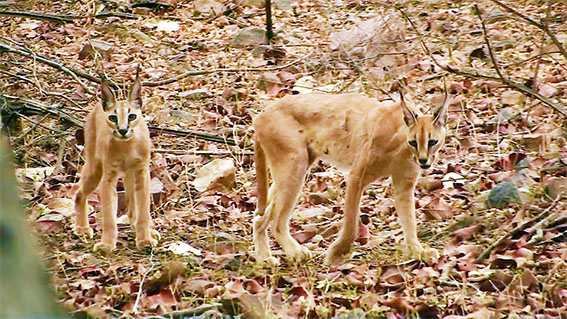Biodiversity & Environment
Advisory for Management of Human-Wildlife Conflict
- 08 Jan 2021
- 5 min read
Why in News
Recently, the Standing Committee of National Board of Wildlife (SC-NBWL) in its 60th meeting has approved the advisory for management of Human-Wildlife Conflict (HWC) in the country.
- In the meeting approval was given for including Caracal, a medium sized wildcat into the list of critically endangered species for taking up conservation efforts with financial support under centrally sponsored scheme Integrated Development of Wildlife Habitat.
Key Points
- The Advisory:
- Empower Gram Panchayats: The advisory envisages empowering gram panchayats in dealing with the problematic wild animals as per the WildLife (Protection) Act, 1972.
- Provide Insurance: Utilising add-on coverage under the Pradhan Mantri Fasal Bima Yojna for crop compensation against crop damage due to HWC.
- Augmenting Fodder: It also envisages augmenting fodder and water sources within the forest areas.
- Take Proactive Measures: The advisory prescribes inter-departmental committees at local/state level, adoption of early warning systems, creation of barriers, dedicated circle wise Control Rooms with toll free hotline numbers which could be operated on 24X7 basis, Identification of hotspots and formulation and implementation of special plans for improved stall-fed farm animal etc.
- Provide Instant Relief: Payment of a portion of ex-gratia as interim relief within 24 hours of the incident to the victim/family.
Caracal Cat
- About:
- The caracal wild cat (Caracal caracal) is a rare species in India. They are slender, medium-sized cats with long powerful legs and tufted ears.
- The black tufted ears of this cat are one of its most distinguishing features.
- It is shy, nocturnal, elusive and difficult to spot in the wild.
- Habitat: In India, presence of these Cats has been reported from only three states which are Madhya Pradesh, Gujarat and Rajasthan.
- In Madhya Pradesh it is locally called as Shea-gosh or siyah-gush.
- In Gujarat, Caracals are locally referred to as Hornotro which means killer of a Blackbuck.
- In Rajasthan it is known as Junglee Bilao or Wildcat.
- Threats: Caracals are mostly killed for livestock predation however in some areas of the world it is hunted for its meat and flesh.
- Conservation Status:
- IUCN Red List: Least Concern
- Wildlife Protection Act, 1972: Schedule I
- CITES: Appendix I
- The caracal wild cat (Caracal caracal) is a rare species in India. They are slender, medium-sized cats with long powerful legs and tufted ears.
Human-Wildlife/Animal Conflict
- About:
- It refers to the interaction between wild animals and humans which results in a negative impact on people, animals, resources, and habitats.
- Causes:
- Urbanization: In modern times rapid urbanization and industrialisation have led to the diversion of forest land to non-forest purposes, as a result, the wildlife habitat is shrinking.
- Transport Network: The expansion of road and rail network through forest ranges has resulted in animals getting killed or injured in accidents on roads or railway tracks.
- Population: The increasing population has also led to many human settlements coming up near the peripheries of protected areas and encroachment in the forest lands by local people for cultivation and collection of food and fodder etc. therefore increasing pressure on limited natural resources in the forests.
- Recent Initiatives/Developments:
- Recently, the Supreme Court (SC) affirmed the right of passage of the Elephants and the closure of resorts in the Nilgiris elephant corridor. It held that it was the State’s duty to protect a “keystone species” like elephants.
- The Odisha Government has started casting seed balls (or bombs) inside different reserve forest areas to enrich food stock for wild elephants.
- The Uttarakhand government carried out bio-fencing by growing various species of plants in the areas in order to reduce the man-animal conflict, prevent wild animals from entering residential areas, and protect agricultural crops and livestock in areas adjoining the forests.
- In 2018, the Uttar Pradesh government has given its in-principle approval to bring man-animal conflict under listed disasters in the State Disaster Response Fund to ensure better coordination and relief during such incidents.
- In the Western Ghats of India, a new conservation initiative has utilized texting as an early warning system to prevent human-elephant encounters. Elephant tracking collars embedded with SMS chips automatically text nearby residents, warning them of recent elephant movements.





